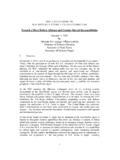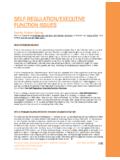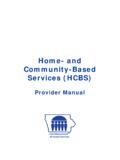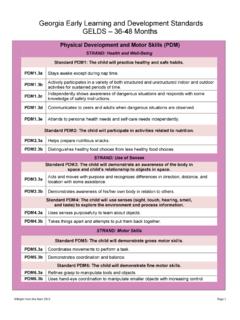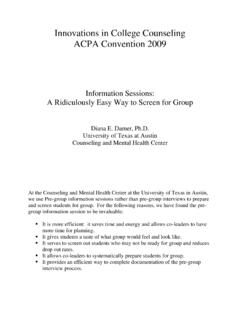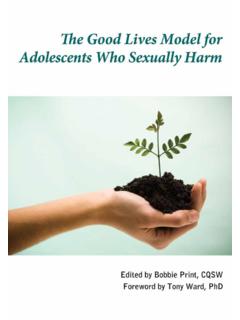Transcription of Children with sexual behavior problems: Myths …
1 SEXUALLY. REACTIVE. Children . PARENT. HANDBOOK. DEFINITION: sexual ACTING OUT. Sexually acting out refers to Children who engage in sexual behaviors that are not ordinary for their age, or that are hurtful to others, or that elicit adult concern. Sexually acting out also refers to sexual behaviors that result not from normal child development but from trauma, anxiety or abuse of the child. Children who show normal sexual behavior or exploration associated with expected development are not considered to be acting out. Children sexually act out for many different reasons. Not all Children who sexually act out have been abused, but the majority has. Not all Children who have been sexually abused show sexual behaviors, but many do. Some Children do not engage in sexually acting out behaviors until years after their initial abuse.
2 sexual aggressiveness is a form of sexually acting out that includes coercive, forceful and/or manipulative sexual behavior towards others. Every act of sexualized behavior has the potential for increasing the probability of future acts. Other terms used to describe these behaviors include sexually reactive, perpetrators, sexually aggressive, Children who molest, prepubescent offenders and victim-perpetrators and sexualized Children . Sexually acting out may include: o sexual language ( , direct and inadvertent statements). o Increased sexual exploration o Exhibitionism o Excessive masturbation and often in public o Inappropriate physical boundaries o Intense preoccupation with sexual matters o sexual aggression towards other Children , adults or animals Please share without permission. Village Counseling Center Page 1. RELATED Myths .
3 Only Children with sexual problems display sexual behavior towards other Children . Half of all adults report having participated in sex play as Children ( , between infancy and adolescence). Young Children who show sexually aggressive behavior are just curious. Children who sexually touch others are all victims of sexual abuse. Sexually abused Children and youth are scarred or damaged forever. Many Children and youth who have been victims of sexual abuse do heal and go on to lead normal lives like everyone else. In most cases, sexual abuse leaves no visible physical marks on a person, and no one will know that abuse has occurred unless a person is told. Children are too young to remember abuse or abusing. We need to leave them alone. Children and youth are sexually abused because their parents/caregivers neglected to care for, or supervise them properly.
4 Offenders use a range of tactics to gain access to their victims. The offender alone is responsible for what he does. Many offenders are experts in manipulating both the victim and the people who care for her. I know my child has told me everything. My child will grow up to be a pedophile (child sexual molester). There are no statistics available to support this. Many Children who are sexually abused do not become child sexual abusers when they grow up. If we don't talk about the abuse and ignore it, it will go away. Young Children will grow out of sexualized behavior if it isn't talked about. Unless you do something about abuse, such as talking about it or getting help through counseling and/or treatment, the pain and harm it causes may not go away, and could create more problems either immediately or sometime in the future.
5 Please share without permission. Village Counseling Center Page 2. Continuum of Children 's sexual behavior : Normal to Disturbed GROUP I: GROUP II GROUP III: GROUP IV: Normal Sexually Extensive Children sexual Reactive Mutual Who Exploration sexual Molest Behaviors Normal Disturbed GROUP I: Normal sexual Exploration Voluntarily and exploratory in nature. sexual behavior based on the discovery and development of their physical and sexual selves. Characterized by spontaneity and lightheartedness (fun and silly). Interest in sex is intermittent and balanced with curiosity about all things. sexual behavior may leave the child feeling embarrassed but not fearful or anxious. Done solitarily or with friends of similar age and size; less often with siblings. Usually do not include feelings of deep shame, fear or anxiety. For teens this often involves intense feelings for the opposite sex and sexual exploration in relationships.
6 Behaviors may need limits, guidance or education, but are not considered abnormal or pathological. Infancy Children begin to explore their bodies, including their genitals. Skin touch is the primary method infants have available for learning about their bodies, other's bodies, and their sexuality. Other people's response to that body exploration is one of the earliest forms of social learning. Childhood Half of all adults report having participated in sex play as Children . Children express interest in feelings aroused by touching their genitalia in the same way they express interest in the light of the moon, or a flower blooming. Children express general interest in others' bodies and may touch. Adult reactions teach shame or that privacy is important for certain behaviors. Masturbation occurs naturally in boys and girls, and begins in infancy.
7 By the age of two or three years, most Children have learned that masturbation in front of others is likely to get them in trouble. Please share without permission. Village Counseling Center Page 3. Pre-Adolescence A strong interest in viewing (via photographs, films, videos, etc.) other people's bodies. Very few Children become sexually active in pre-adolescence. When they do, adults usually initiate it. sexual activity or play during this age usually represents the use of sex for non- sexual goals and purposes. Adolescence Adolescence itself is generally marked by the societal acknowledgment of sexual capacity. The way other people react to a teen's physical sexual characteristics (body hair, formation of breasts, deepening of the voice, beginning of menses) have a profound affect on both the young person's sense of self esteem and the development of his/her social skills.
8 The adolescent develops a growing awareness of being a sexual person, and of the place and value of sex in one's life, including such options as celibacy. The adolescent may work toward significant resolution of confusion and conflict about sexual orientation. It is during this time that individuals are able to join together the physical and social aspects of sex and sexuality. Most adolescents practice some types of interactive sexual behaviors with others, such as fondling, open-mouth kissing, and simulated intercourse. GROUP II: Sexually Reactive sexual behaviors may be frequent with their sexuality being out of balance compared to their peer group. More sexual behaviors than Group I and has a preoccupation with sexuality. Many of the behaviors are self-stimulating but may be directed toward and/or done in view of adults.
9 Coerce other Children , though the other Children may dislike or be bothered by the behavior ; no threats; no attempt to hurt. sexual behavior often represents a partial form of reenactment of sexual abuse the child has sustained and may be the child's way of trying to understand. Have trouble integrating and understanding such stimulation and express this confusion in increased sexual behavior . Often feel shame, guilt, anxiety, and fear related to the upsurge or aftermath of the sexual behaviors. Many have been abused or exposed to pornography and sexual stimulation. Difference in age is usually not great and force is not usually involved. Respond well to therapy and education. When the anxiety is reduced or more age appropriate and less sexually stimulating environments are encouraged, the level of sexual behavior tends to decrease.
10 Please share without permission. Village Counseling Center Page 4. GROUP III: Extensive Mutual sexual Behaviors sexual behaviors are often habitual and extensive with the child participating in the full spectrum of adult sexual behaviors. Generally with other Children in the same age range, and conspire to keep the behaviors secret. Often distrustful; chronically hurt and abandoned by adults; relate best to other Children . sexual behaviors are a way of coping with feelings of abandonment, loss, and fear. May or may not experience sexual pleasure. Often approach sexuality as just the way they play . Usually more resistant to treatment than Group Two Use persuasion but usually not force or physical/emotional coercion to gain other Children 's participation in sexual acts. Characteristically without emotional affect around sexuality - neither have the lighthearted spontaneity of normal Children nor the shame and guilt of the sexually reactive Children .




